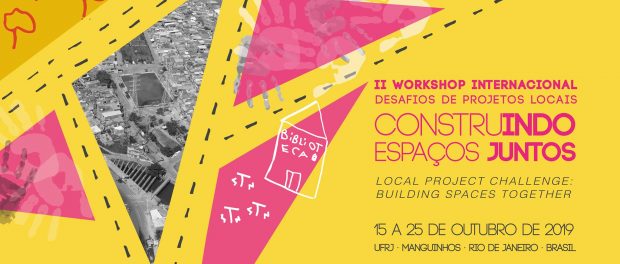CatComm on Participation at Rio’s 2nd International Workshop on Challenges to Local Projects: How to Build Spaces Together
How are we building our cities? Who participates in decisions about city production and management? What are the landscape transformation potentials? These and other issues were addressed in the II International Workshop—Local Project Challenges: Building Spaces Together, an event that discussed contemporary city production in conditions of inequality, fragility, and conflict. The objective was to collectively elaborate a participatory urban intervention project through collaborations and co-productions with researchers, professionals, government representatives, community representatives and other civil society bodies in the Manguinhos neighborhood, in the northern area of Rio de Janeiro.
Catalytic Communities’ Institutional Director, Roseli Franco, and Institutional Development Coordinator, Clara Ferraz, were invited to participate in a roundtable discussion on “Participatory processes, teaching, and professional practice”. They spoke on how CatComm’s work ties into the SDGs, on Sherry Arnstein’s Ladder of Participation, on Asset-Based Community Development (ABCD) and shared 10 Principles for Mobilizing a Community.
They shared the table with Thaís Rennó de Andrade and Daniel Mancebo, from Rio de Janeiro City’s Sustainable Development Plan, and Pablo Benetti, coordinator of the Housing and Urban Form Laboratory of the PROURB-FAU Graduate Program in Urbanism at the Federal University of Rio de Janeiro. The discussion was mediated by Vera Tângari, Associate Professor at Federal University of Rio de Janeiro in the Architecture Projects Department and a professor in the PROARQ-FAU Graduate Program in Architecture.
As a preparatory event for the XXVII World Congress of Architects UIA2020RIO, the realization of this Workshop and its activities were part of the realization of the project “Sustainable Development Goals and the New Urban Agenda: equity, urban resilience and social and environmental sustainability”, unfolding the integrated research of the GAE – Environment Education Group, SEL-RJ – Free Space Systems in Rio de Janeiro and ProLugar – Place Design and Quality, all linked to the Federal University of Rio de Janeiro’s PROARQ-FAU Graduate Program in Architecture.

